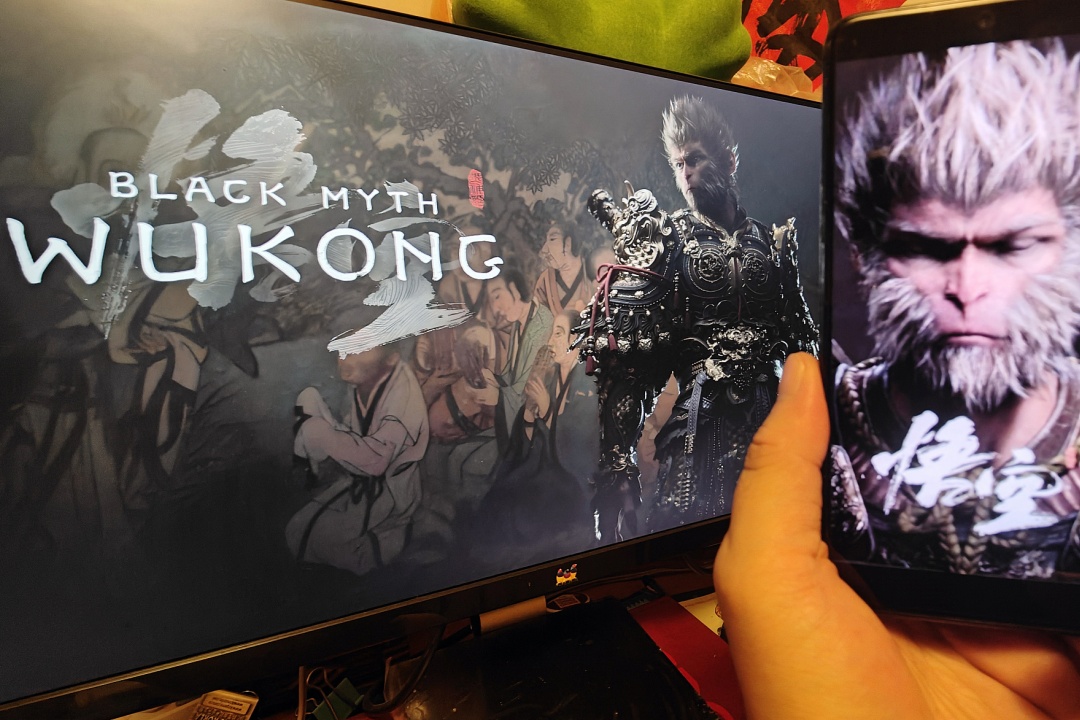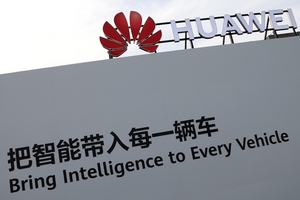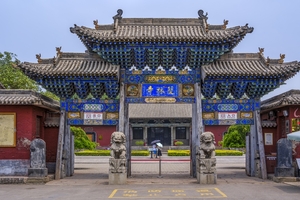Tech Roundup: Wukong Takes Gaming Industry by Storm, Alibaba to Tap Mainland Investors
Listen to the full version

Welcome to the Tech Roundup — a briefing of the top technology news making headlines in China and the rest of Asia.
Tencent-backed title makes a splash across video game industry
The global debut of Tencent Holdings Ltd.-backed Black Myth: Wukong has generated a level of public excitement not seen in the video game industry for years.
The action-adventure role-playing title, available on PC and PlayStation 5, is based on the Chinese mythological figure Monkey King and the classic Chinese novel “Journey to the West.”

Download our app to receive breaking news alerts and read the news on the go.
Get our weekly free Must-Read newsletter.
- DIGEST HUB
- The Tencent-backed game *Black Myth: Wukong* debuted with 2.1 million concurrent players on Steam, surpassing *Cyberpunk 2077* and *Elden Ring*.
- Alibaba upgraded its Hong Kong listing to primary status to tap into Chinese mainland investments, despite having posted a 4% revenue rise and a 27% profit dip recently.
- Baidu reported a 0.4% revenue drop amid challenges in monetizing AI, while its Ernie language model gradually contributes more sales.
The Tech Roundup covers key technology news in China and Asia. Here’s a summary of the major points:
1. The Tencent-backed game "Black Myth: Wukong" has created significant buzz in the video game industry, achieving over 2.1 million concurrent players on Steam upon release, surpassing popular titles like "Cyberpunk 2077" and "Elden Ring" [para. 2][para. 3]. The game, based on the Chinese mythological figure Monkey King and the classic novel "Journey to the West," owes part of its success to governmental support and substantial development resources [para. 4]. However, its long-term commercial success remains uncertain due to limited monetization opportunities for console games [para. 5].
2. Alibaba Group Holding Ltd. has upgraded its Hong Kong listing to primary status, which is expected to draw considerable investment from the Chinese mainland. This move was prompted by strategic considerations amid rising U.S.-China tensions and aims to connect to Shanghai and Shenzhen bourses [para. 6][para. 7]. Despite this maneuver, Alibaba faces challenges such as increasing competition and sluggish consumer spending in China. The company recently reported only a 4% revenue increase and a 27% drop in profit, highlighting these difficulties [para. 8].
3. Baidu Inc. reported a small decrease in revenue, which underscores the struggles it faces in pivoting from search ads to AI-driven services amid an economic downturn in China [para. 9]. For the quarter ending in June, Baidu's revenue was 33.9 billion yuan ($4.7 billion), slightly below projections, while net income was 5.5 billion yuan, surpassing estimates [para. 10]. The company’s generative AI model "Ernie" has contributed to sales in ad and cloud services. However, Baidu still faces stiff competition in the AI sector from Alibaba and Tencent and remains reliant on advertising for revenue [para. 11].
4. Nio Inc., a Chinese EV maker, announced a plan to place battery charging stations in all of China’s 2,800+ counties by mid-2025 [para. 12]. The company also aims to offer its battery swap service in over 2,300 counties by the end of 2025, with more regions to follow in 2026 [para. 13]. To achieve this, Nio launched a partnership program involving six companies, including a subsidiary of China Energy Engineering Co. Ltd. [para. 14].
5. Huawei Technologies Co. Ltd.’s smart car unit attained a valuation of 115 billion yuan ($16 billion) post a recent investment by EV-maker Avatr Technology Inc. [para. 15]. Avatr, backed by Chongqing Changan Automobile Co. Ltd. and Contemporary Amperex Technology Co. Ltd., is set to make the payment in three instalments, which involves the integration of Huawei’s smart car tech and talent into the unit. Additionally, Avatr will gain a seat on the seven-member board [para. 16].
6. Volant Aerotech Co. Ltd., a Chinese startup focusing on electric vertical takeoff and landing aircraft, completed a new funding round, raising hundreds of millions of yuan [para. 17]. Supported by investors like Beijing Robot Industry Fund and others, the funding is part of Volant’s A1 Series, raising $100 million aimed at advancing R&D and accelerating airworthiness certification and commercial market development [para. 18][para. 19][para. 20].
This summary encompasses essential updates on recent developments in the Chinese tech landscape across various sectors, illustrating significant strides and ongoing challenges faced by companies.
- Tencent Holdings Ltd.
- Tencent Holdings Ltd. backed the video game "Black Myth: Wukong," which garnered significant public excitement and over 2.1 million concurrent players on Steam at its global debut. Despite its strong debut, the game's commercial viability remains uncertain due to challenges in monetizing console titles.
- Alibaba Group Holding Ltd.
- Alibaba Group Holding Ltd. shareholders approved a plan to upgrade its Hong Kong listing to primary status to attract investment from the Chinese mainland. The move connects Alibaba to the Shanghai and Shenzhen bourses. Despite this, Alibaba's shares have underperformed amid competition and slow China consumption, with its revenue rising only 4% and profit plunging 27% recently.
- Baidu Inc.
- Baidu Inc.’s revenue for the three months ended June dipped 0.4% to 33.9 billion yuan ($4.7 billion), highlighting its difficulties in transitioning from search ads to AI during China’s economic downturn. Net income was 5.5 billion yuan. Despite advances with its “Ernie” AI, Baidu faces strong competition from Alibaba and Tencent in the AI space, which may delay its shift away from advertising revenue.
- Nio Inc.
- Nio Inc. unveiled a plan to build battery charging stations in over 2,800 Chinese counties by mid-2025 and aims to offer battery swap services in more than 2,300 counties by the end of 2025. The company has launched a partnership program with six companies, including a subsidiary of China Energy Engineering Co., to support this expansion.
- Huawei Technologies Co. Ltd.
- Huawei Technologies Co. Ltd.'s smart car unit has reached a valuation of $16 billion, only seven months after its establishment. A recent investment by Avatr Technology Inc. facilitated this surge. Avatr, an EV startup backed by Chongqing Changan Automobile Co. Ltd. and Contemporary Amperex Technology Co. Ltd., will acquire a 10% stake in Huawei's unit. The deal involves the integration of Huawei’s smart car technologies and allows Avatr to appoint a director to the board.
- Shanghai Volant Aerotech Co. Ltd.
- Shanghai Volant Aerotech Co. Ltd. is a Chinese startup developing electric vertical takeoff and landing (eVTOL) aircraft. They secured hundreds of millions of yuan in new funding, led by Beijing Robot Industry Fund, for research and development, airworthiness certification, and commercial market development. Investors include Beijing Jingguorui Equity Investment Fund, Shoucheng Holdings, and Yanchuang Capital. Further funding rounds are in preparation.
- January 2024:
- Huawei's smart car unit, Shenzhen Yinwang Intelligent Technology Co. Ltd., was established.
- Monday, August 18, 2024:
- Shanghai Volant Aerotech Co. Ltd. secured hundreds of millions of yuan in a new funding round.
- Tuesday, August 20, 2024:
- The global debut of Tencent-backed Black Myth: Wukong, garnering more than 2.1 million concurrent players on Steam.
- Tuesday, August 20, 2024:
- Nio unveiled an ambitious plan to build battery charging stations in each of the more than 2,800 counties across the Chinese mainland by the end of June 2025.
- Tuesday, August 20, 2024:
- Nio launched a partnership program with six companies, including a subsidiary of China Energy Engineering Co. Ltd., to build battery charging facilities.
- PODCAST
- MOST POPULAR







 Sign in with Google
Sign in with Google
 Sign in with Facebook
Sign in with Facebook
 Sign in with 财新
Sign in with 财新